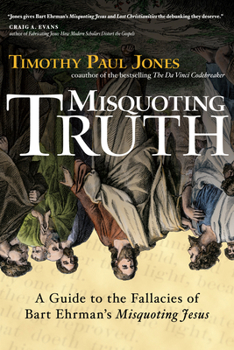Misquoting Truth: A Guide to the Fallacies of Bart Ehrman's "Misquoting Jesus"
Select Format
Select Condition 
Book Overview
"What good does it do to say that the words of the Bible] are inspired by God if most people have absolutely no access to these words, but only to more or less clumsy renderings of these words into a language? . . . How does it help us to say that the Bible is the inerrant word of God if in fact we don't have the words that God inerrantly inspired? . . . We have only error-ridden copies, and the vast majority of these are centuries removed from the originals."So contends Bart D. Ehrman in his bestselling Misquoting Jesus. If altogether true, we have little reason to put our confidence in Scripture. Add to this Ehrman's contention that what we read in the New Testament represents the winners' version of events, twisted to suit their own purposes and not at all a faithful recounting of what really happened, and the case for skepticism and unbelief gives every appearance of being on solid footing. But are things really so bad off? Were the New Testament documents widely distorted by copyists? Can we in fact have no idea what was in the originals? Do we have no hope of knowing what eyewitnesses said and thought? Are other documents left out of the New Testament better sources for understanding early Christianity? While readily conceding that Ehrman has many of his facts straight, pastor and researcher Timothy Paul Jones argues that Ehrman is far too quick to jump to false and unnecessary conclusions.In clear, straightforward prose, Jones explores and explains the ins and outs of copying the New Testament, why lost Christianities were lost, and why the Christian message still rings true today.






